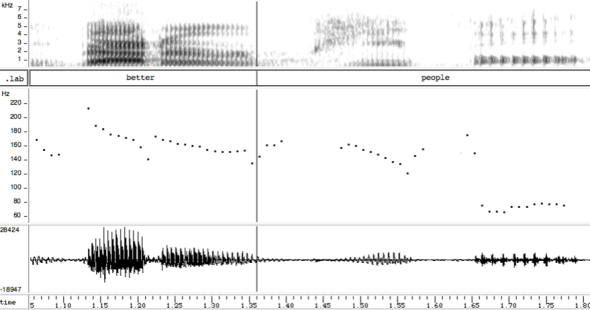New Vocal Fry Culprit: Butt Tension!

Photo by Skip Bolen/Getty Images for Spanx
In the Huffington Post recently, theater enthusiast and educator Jen Olenizcak—under the headline "Are Spanx Causing Vocal Fry?"—wrote the following:
New Yorkers are incredibly tense. Articles have been written about our anxiety issues—most adults are incredibly tense.
And the butt tension! I hear so many pinched, throaty Kardashian voices, and when lamenting about the correlation I saw between this body image pulling-it-all-in problem and fry, before a class, a woman suggested the Spanx connection. Now I really don't think one product caused it all, but the act of "pulling-it-all-in" certainly does.
So try it, clench your butt, suck it all in and say hello. Now let it go and say hello. That drop in your voice that probably happened? The clench contributes to shallow breathing and a throaty voice. So loosen up!
First of all, this diagnosis has it backwards. "Vocal fry" typically happens when relaxed vocal cords, combined with lower subglottal pressure, causes an irregular vibration of the cords, most often at the ends of phrases and with falling intonation. As Wikipedia puts it:
The vocal fry register … is the lowest vocal register and is produced through a loose glottal closure which will permit air to bubble through slowly with a popping or rattling sound of a very low frequency.
Then, later in the same article, Olenizcak warns that:
We are lazy speakers:
This isn't a surprise. Say this sentence out loud: "Betty Botter bought a bit of bitter batter." Was it hard? Did you change T to D and say, in essence, 'Beddy Bodder'?
Wait, are we too tense or too lazy? I get the feeling that two different topics are being pulled out of the advice bin here, without enough thought about how they go together. If you did indulge in what linguists call "flapping and voicing" in those six instances of the T sound, the reason is not that you're lazy, but that you're an American. Enunciating Ts as Ds is a normal part of (most kinds of) American speech. If you stopped doing it, while retaining the rest of your speech patterns, you'd sound weird. Try it and see.
In fact, we can examine Olenizcak's own speech in her TEDx Talk about the virtues of improv comedy classes. Here's a sample sentence from the very first minute. Listen for her pronunciation of "better" as "bedder":
I'll note also, without getting too technical, that her voice exhibits what looks, measures, and sounds a lot like vocal fry on the word "people." Strictly speaking, not yet vocal fry, but very close:

This is not because her butt is too tense, but because she's a normal American woman. Olenizcak suggests that we would all be "bedder" off if we took an improv class. I'll go along with that, and I'll add that a linguistics class might also be a good idea.